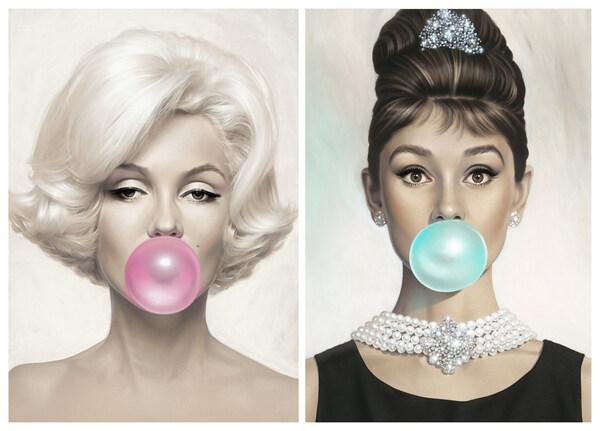Michael Moebius, a German artist known for painting pop-culture icons blowing bubble gum, has won a “monumental” copyright infringement lawsuit against hundreds of foreign counterfeiters. The artist was awarded a total of $120 million, which his team called the “largest ever awarded to a living independent artist” in a statement.
Moebius sued 399 separate companies based in China and other foreign nations that he claimed had violated his copyright by selling “counterfeit versions” of his images, according to the complaint filed in the U.S. District Court for the Northern District of Illinois.
The artist also alleged that the companies had gone to “great lengths” to shield themselves from liability and “the full scope and interworking of their counterfeiting operation,” the lawsuit reads.
“Over a decade, I have faced hundreds of thousands of copyright violations of my artworks,” Moebius said in a post on Instagram ahead of the court ruling.
The ruling ending the case was issued after Moebius had filed a motion for a default judgment order against three final defendants who had failed to appear before the court, records obtained by Artnet News show.
“None of the defaulting defendants having answered or appeared in any way, and the time for answering having expired, so that the allegations of the complaint are uncontroverted and are deemed admitted,” the judge wrote in his decision.
Moebius had previously won default judgments against numerous other defendants from February through April after they had also failed to answer court subpoenas, while the artist moved to dismiss cases against several of the companies.
During litigation, some of the defendants had tried to fight off the lawsuit – pushing for dismissals and delays while court records indicate that some of the defendants had hired a Chinese attorney to attempt to negotiate a settlement.
The judge, in his latest order, also permanently banned the companies from further selling any other products without permission from Moebius and the transfer of the company’s domain names to the artist’s control, court records show.
“In an environment where prestigious luxury houses like Hermès, Gucci, Louis Vuitton, and Dior grapple with rampant infringement, Moebius’s distinctive works have experienced similar challenges,” the statement from Moebius’s team reads.
“This parallel not only accentuates the global allure and high demand for Moebius’s creations but also underscores the landmark significance of this court case in safeguarding the sanctity of original artwork and intellectual property.”
The revelation of Moebius’s legal victory, formally won last week, came the same day the U.S. Supreme Court issued its verdict in photographer Lynn Goldsmith’s lawsuit against the Andy Warhol Foundation.
Goldsmith had sued the foundation over screenprints the legendary pop artist had made using a photograph she had taken of the late musician Prince before he became famous.
The Supreme Court ruled 7-2, with Associate Justice Elena Kagan and Chief Justice John Roberts dissenting, that Warhol had violated her copyright protection.
The duo of legal challenges to copyright violations could set precedents for how artists and photographers can use the work of others and fight back when their own copyrights are violated.

























